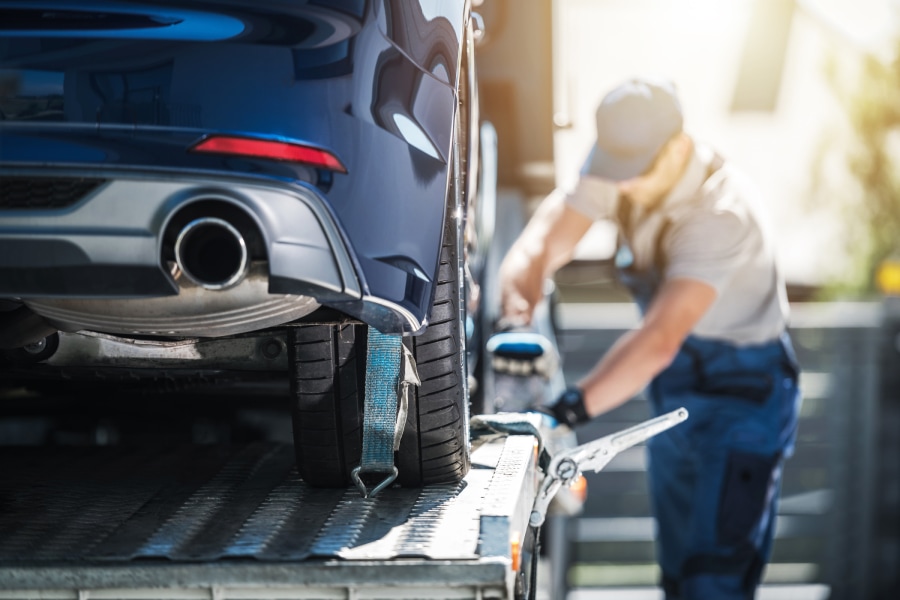Urban and rural towing presents distinct differences and challenges that require tailored approaches for effective and safe towing. Understanding these variations is crucial for anyone who may need to perform a tow – whether for your own vehicle, as a favor, or as a part of your profession.
We’ll explore effective strategies for both urban and rural towing, providing insights on how to navigate the challenges each setting presents.
Below, you’ll get practical tips for ensuring safety, optimizing costs, and enhancing communication during the towing process. By understanding these elements, you’ll understand what Chandler tow trucks and wrecker services face when it comes to providing tow services.
Understanding Urban Towing
Urban towing has its own set of characteristics and challenges that are quite different from rural towing. Factors like heavy traffic, narrow streets, and parked vehicles make towing operations more complicated in urban areas.
Characteristics of Urban Towing
- Heavy Traffic: The constant flow of vehicles requires heightened awareness and strategic planning.
- Narrow Streets: Maneuvering through tight spaces demands precision to avoid accidents.
- Parking Regulations: Local laws can complicate the towing process, necessitating familiarity with specific regulations.
Challenges Faced in Urban Environments
Navigating urban areas poses several challenges:
- Tight Spaces: Finding suitable locations to load or unload can be difficult, especially with larger vehicles.
- Stop-and-Go Traffic: Responding quickly in congested conditions is essential. It is crucial to maintain a safe distance from other vehicles to minimize the risk of collisions.
Tips for Safe Urban Towing
To ensure effective and safe urban towing, consider these essential tips:
- Effective Communication: Maintain clear communication between the towing vehicle operator and the driver of the towed vehicle. Use hand signals or two-way radios when necessary.
- Adjustable Hitches: Utilize adjustable hitches to facilitate tight turns. This feature allows for better maneuverability in restricted spaces.
- Route Planning: Prioritize route planning by identifying potential congestion points and low bridges. Using navigation apps can provide real-time traffic updates, helping you avoid delays.
Additional Urban Towing Strategies
- Enhance Visibility: Utilize mirrors and camera systems to improve visibility around your vehicle. This adjustment helps in monitoring blind spots and ensuring safe lane changes.
- Stay Calm Under Pressure: In high-stress environments such as dense traffic, keeping a calm demeanor aid in making sound decisions quickly.
- Anticipate Traffic Patterns: Understanding local traffic patterns can lead to more efficient travel times. Familiarizing yourself with peak hours may help avoid unnecessary complications.
Urban towing requires flexibility and readiness. Successful urban towing depends on being proactive and understanding the specific challenges posed by driving conditions in cities.
Understanding Rural Towing
Rural towing presents unique challenges and requires specific strategies to ensure safety and efficiency. Unlike urban environments, rural areas often involve rough terrains and unpaved roads that can complicate towing operations. Here are essential considerations and tips for successful rural towing.
Tips for Safe Rural Towing
1. Assess the Terrain
Before embarking on a towing journey, evaluate the road conditions. Be prepared for gravel roads, steep inclines, and potential obstacles such as fallen branches or animals crossing.
2. Adjust Your Driving Techniques
- Take turns slowly, especially on narrow paths.
- Maintain a lower speed to enhance control over your vehicle and towed load.
- Be cautious of sudden stops; give yourself ample space to brake safely.
3. Carry Essential Tools and Supplies
- Spare Parts: Having spare tires, fuses, and basic tools on hand can save time during emergencies. A flat tire on an unpaved road can be challenging to manage without proper equipment.
- First Aid Kit: Accidents can happen when least expected. A well-stocked first aid kit ensures you’re prepared for minor injuries while on the road.
4. Prepare for Limited Assistance Availability
- In rural areas, immediate assistance may not be readily available. Familiarize yourself with the nearest service stations or garages before heading out.
- Carry a reliable means of communication. Mobile signals may be weak in some remote locations. Consider having a satellite phone or two-way radios for emergencies.
5. Know Your Emergency Procedures
- Understand how to handle breakdowns effectively. This includes knowing how to secure your vehicle safely and signaling for help.
- Familiarize yourself with local emergency numbers, especially if traveling through unfamiliar regions.
6. Plan Your Route
- Research your path beforehand. Identify any potential hazards like low bridges or steep grades that could impact towing safety.
- Use GPS devices equipped with off-road capabilities to navigate tough terrains more efficiently.
Safety Measures in Long Distance Towing
When engaging in rural towing, understanding the unique challenges is essential. Navigating through rough terrains and unpaved roads requires specific safety measures. Here are key components to consider:
1. Essential Safety Equipment
- Rated Tow Hitches: Ensure your towing vehicle is equipped with a hitch that meets or exceeds the weight capacity of the towed vehicle.
- Safety Chains/Cables: Always use safety chains or cables to provide an additional layer of security in case of hitch failure.
2. Regular Component Inspection
Prior to embarking on a long journey, inspect the following:
- Tires: Check for proper inflation and tread wear.
- Brakes: Ensure both vehicles’ braking systems are functioning effectively.
- Fluids: Monitor oil, coolant, and brake fluid levels to avoid breakdowns.
Rural environments often present limited service availability during emergencies. Prepare for this by developing emergency procedures for towing, including having a reliable means of contacting assistance. Carrying spare parts and tools can also be vital in addressing unexpected issues on the road.
Understanding these characteristics of rural towing enhances your preparedness, ensuring a safer experience throughout your journey.
Cost Comparison: Urban vs. Rural Towing
Understanding towing cost factors is crucial for anyone considering towing services, whether in urban or rural settings. Here are the primary elements that influence flatbed towing costs:
- Distance Towed: Longer distances generally lead to higher costs. Urban areas may have shorter tow distances but can incur additional fees due to traffic and congestion.
- Time of Day: Rates can fluctuate based on when you require services. Night or weekend towing often comes with premium charges.
- Vehicle Size and Weight: Heavier and larger vehicles typically cost more to tow. Specialized equipment may be necessary for oversized vehicles, increasing the overall expense.
- Location: Urban environments often have higher demand, resulting in elevated rates compared to rural areas where accessibility issues might add additional costs.
- Vehicle Condition: The state of the vehicle plays a significant role. Damaged vehicles may require specialized equipment or extra manpower, contributing to increased charges.
Awareness of these factors can help you plan better and avoid unexpected expenses while ensuring your vehicle’s safety during the towing process. Researching multiple towing companies will further assist you in finding the best value for your needs.
Keeping You and Your Vehicle Safe No Matter the Destination
Effective and safe towing practices are essential whether navigating urban or rural landscapes. Understanding the differences and challenges of each environment helps in developing effective strategies.
Urban Towing Strategies
- Visibility: Utilize mirrors and camera systems for enhanced awareness.
- Route Planning: Identify alternatives to congested areas, avoiding low bridges and narrow streets.
- Communication: Maintain clear contact between the towing vehicle and the driver of the towed vehicle.
Rural Towing Considerations
- Preparation: Carry spare parts, tools, and a first aid kit, anticipating limited roadside assistance.
- Driving Techniques: Adjust to rough terrains with caution, ensuring your vehicle is equipped for potential challenges.
For further insights into towing practices tailored to your specific needs, consider reaching out to a towing service. With Chandler tow trucks, Our expertise can enhance your safety and efficiency on the road.
FAQs
What are the key differences between urban and rural towing?
Urban towing typically involves navigating heavy traffic and narrow streets, while rural towing often requires dealing with rough terrains and unpaved roads. Each environment presents unique challenges that tow operators must be prepared for.
What challenges do tow operators face in urban environments?
In urban areas, tow operators encounter tight spaces, stop-and-go traffic, and complex parking regulations. Effective communication and route planning are essential to navigate these challenges safely.
What should I carry for safe rural towing?
When towing in rural areas, it’s important to carry spare parts, tools, and a first aid kit. Be prepared for limited assistance availability in case of emergencies.
What safety measures should I take for long-distance towing?
Essential safety equipment includes rated tow hitches and safety chains or cables. Regular inspection of all components before embarking on a long journey is crucial to ensure safety.
How do costs compare between urban and rural towing?
Towing costs can vary based on several factors including the distance towed, time of day, and the specific challenges presented by either urban or rural environments. It’s important to consider these factors when estimating costs.
What are some effective towing tips for urban areas?
Some effective tips for safe urban towing include using adjustable hitches for tight turns, planning routes to avoid congestion and low bridges, and maintaining effective communication between the towing vehicle and the towed vehicle driver. If you need assistance, consider using a trusted Chandler wrecker service or a professional Chandler towing company for peace of mind.





